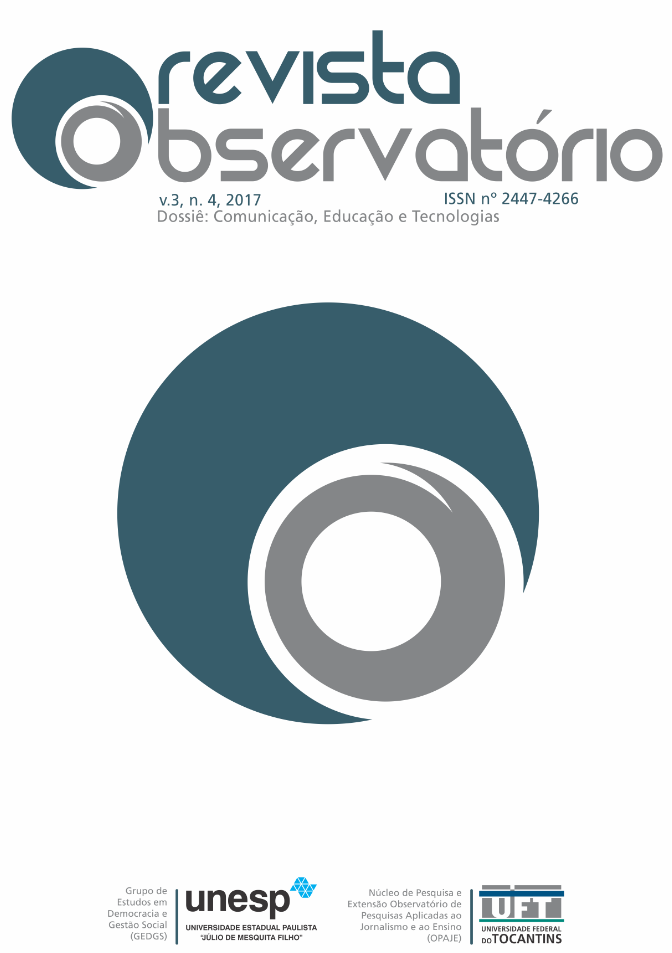LEARNING METHODOLOGIES THAT CHALLENGE STUDENTS, MEASURED BY DIGITAL TECHNOLOGIES
DOI:
https://doi.org/10.20873/uft.2447-4266.2017v3n4p256Keywords:
mobile learning, active methodologies, mobile devices, flipped learning, gamificationAbstract
Studying the Portuguese language and Portuguese literature is an invitation to students to get to know and appreciate their mother language. We expect them to master the different forms of expression, remember conceptual content, and be competent in different contexts. In order to do this we think there is a need to integrate active teaching and learning methodologies that can help develop curriculum and core competences. The integration of digital tools into the educational process, such as the mobile devices that students bring to the classroom, helps us to achieve educational goals and create innovative and motivational curriculum products and resources. In this text we share some pedagogical experiences carried out with students attending Vocational courses and developed to make the Portuguese classes engaging, memorable and challenging moments of learning.
Downloads
References
BILOŠ, A., TURKALJ, D., & KELIĆ, I. (2017). Mobile Learning Usage and Preferences of Vocational Secondary School Students: The cases of Austria, the Czech Republic, and Germany. Naše gospodarstvo/Our Economy, 63(1).
CAMPOS, A.L. (2010). Neuroeducación: uniendo las neurociencias y la educación en la búsqueda del desarrollo humano. La educación, Revista Digital, 143. Disponível em: https://goo.gl/VbglZI . Acesso em: 10 março 2017.
GARCÍA, M.L.S. (2015). El contexto socioeducativo de la ubicuidad y la movilidad. In VÁZQUEZ-CANO, E. y SEVILLANO GARCÍA, M. L., Dispositivos digitales móviles en Educación. Madrid: Narcea, pp. 17-38.
MEIRINHOS, M. (2015). Os desafios da geração Net. Revista de estudios e investigación en psicología y educación, vol. extr, nº13.
MERCIER, E., HIGGINS, S. (2013). Collaborative learning with multi-touch technology: Developing adaptive expertise. Learning and Instruction, 25, 13-23.
MORA, F. (2013). Neuroeducación, solo se puede aprender aquello que se ama. Madrid: Alianza Editorial.
MOURA, A. (2010). Apropriação do Telemóvel como Ferramenta de Mediação em Mobile Learning: Estudos de Caso em Contexto Educativo. Tese de doutoramento, Braga: Universidade do Minho. Disponível em https://goo.gl/E7qvyn . Acesso em: 13 março 2017.
PRENSKY, M. (2013). Enseñar a nativos digitales (1a. ed). México: SM Ediciones.
SAUNDERS, L. (2012). Faculty perspectives on information literacy as a student learning outcome. The Journal of Academic Librarianship, 38(4), 226–236.
UNESCO (2013). Unesco Policy Guidelines for Mobile Learning. Paris: United Nations Educational, Scientific and Cultural Organization.
YARMEY, K. (2011). Student information literacy in the mobile environment. Educause Quarterly, 34(1). Disponível em: https://goo.gl/oIyQt5 Acesso em: 10 abril 2017.
Downloads
Published
How to Cite
Issue
Section
License
[PT] Autores que publicam nesta revista concordam com os seguintes termos:
1. Autores mantém os direitos autorais e concedem à revista, sem pagamento, o direito de primeira publicação, com o trabalho simultaneamente licenciado sob a Creative Commons Attribution License (CC BY-NC 4.0), permitindo o compartilhamento do trabalho com reconhecimento da autoria do trabalho e publicação inicial nesta revista.
Leia todos os termos dos direitos autorais aqui.

